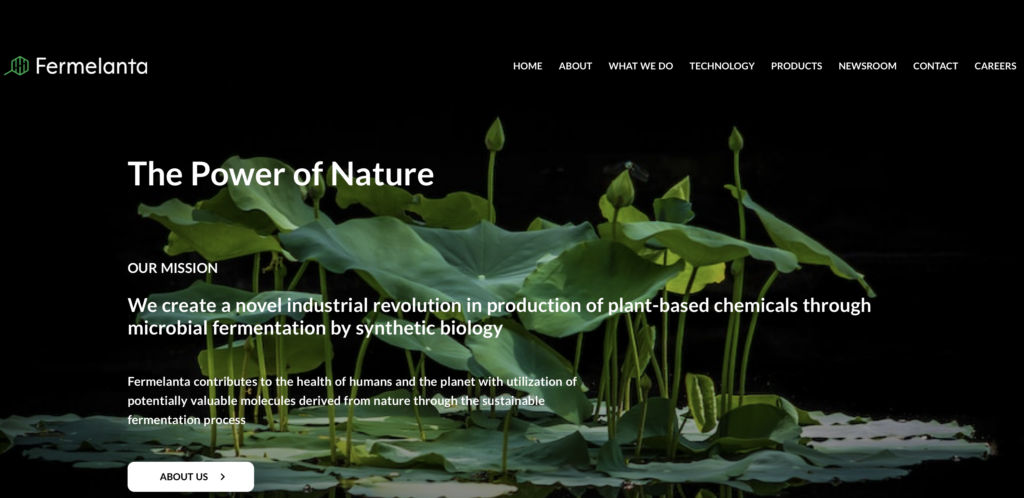https://bio.nikkeibp.co.jp/atcl/column/16/021500017/080100292/
Firmelanta is a startup from Ishikawa Prefectural University that uses E. coli bacteria to create biotech products. The company is currently constructing various recombinant E. coli strains for the production of pharmaceutical and cosmetic ingredients. In addition to its own production of pharmaceutical and cosmetic ingredients using the strains it has developed, the company also engages in contract research to develop strains in response to requests from companies and other organizations.
Currently, the company is mainly engaged in the production of plant secondary metabolites, such as alkaloids and cannabinoids, which are compounds produced through the metabolism of sugar, amino acids, organic acids, and other compounds (primary metabolites) that are essential for the maintenance of plant life. They are used as raw materials for pharmaceuticals and other products.
Farmeranta intends to have E. coli synthesize secondary metabolites from plants and use them as raw materials for pharmaceuticals and other products. Many companies seeking to produce plant secondary metabolites in synthetic biology use yeast as a host. This is based on the idea that it is easier to introduce and express plant genes when yeast, which is a eukaryote like plants, is used as a host. On the other hand, the company has chosen E. coli as its host. Regarding the reason for this, CSO Hiromichi Minami said, “Yeast has a strong control mechanism for gene expression, and we believe there are technical hurdles to artificially raising the expression level. On the other hand, E. coli, which has a simpler control mechanism, is easier to manipulate the control mechanism of gene expression than yeast, and may be easier to use for material production at the commercial level,” he said.
CSO Minami and CTO Akira Nakagawa have more than 10 years of experience in the field of synthetic biology and have the know-how to handle numerous gene transfer challenges. Using this know-how, they have developed a “multi-stage gene transfer technology” that allows genes to be introduced at targeted locations and in the right balance for the production of secondary metabolites, by adjusting the location and order of gene introduction. Using this technology, they have established a technology to introduce 12 genes into E. coli. Once we can introduce about 20 genes, we will be able to synthesize most of the secondary metabolites,” says CSO Minami.
Currently, the company is developing alkaloids such as thebaine and nuciferin, as well as cannabinoids called cannabidiol (CBD), for in-house production. The company plans to sell thebaine as a pharmaceutical ingredient and nuciferin and CBD as functional ingredients for use in supplements, cosmetics, and health foods to pharmaceutical companies. Among these, the company is currently focusing on the synthesis of thebaine and CBD.Thebaine is an alkaloid found in trace amounts in the poppy plant and is used as an ingredient in painkillers and other pharmaceuticals. To synthesize thebaine, it is necessary to introduce about 20 genes into E. coli and adjust the expression levels of each gene. Currently, the yield is still low, so we are working to improve the recombinant form so that the yield will be high enough to withstand mass production.
CBD is one of the cannabinoids contained in the cannabis plant, and is believed to have anti-inflammatory and stress-reducing effects. As a result, the use of CBD in pharmaceuticals, cosmetics, and supplements is spreading, especially in foreign countries. Although it is a component of marijuana, CBD has no hallucinogenic effects and its toxicity is relatively low, and it is not regulated by the Cannabis Control Law. However, it is difficult to extract CBD from cannabis plants because they contain delta-9-tetrahydrocannabinol (THC), a psychotropic component that is subject to regulation under the law. CEO Hiiragizaki cites the advantages of the company’s proprietary technology, saying, “If CBD is made directly from synthetic biology, there is a great advantage in not having to produce THC.
The company is currently conducting research and development to increase the yield and production scale of these secondary metabolites. The company aims to achieve a yield of 1g or more per liter of culture solution by the end of FY2024, after which it plans to gradually improve the yield to 5 to 10g per liter of culture solution for practical production. As for the scale of production, the company aims to scale up to 1,000 to 2,000 liters in 2025 and 10,000 to 20,000 liters in 2027. CEO Hiiragizaki says of the company’s vision, “We want to be able to manufacture at a lower cost than extracting from plants.


